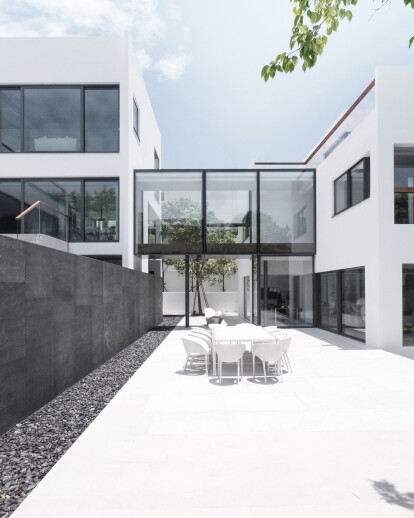The Bridged-House design links two existing houses of different ages and styles as one, spatially, aesthetically and spiritually, while keeping the identity of two houses for the two generations. One major challenge is their being segregated horizontally by the existing long swimming pool, and vertically by a 3m level-change between their living-room floors.
The landscape plinths are demolished for a generous Middle Garden stretching the site’s depth. The swimming pool, with all enclosing walls taken down, overflows to form a backdrop for the Garden.
A new steel bridge connecting the houses at second level, floats above the Middle Garden. This daily path of meeting, together with the Middle Garden and the pool, form the focus of the house.
The houses’ original marble cladding were stripped off, and replaced with white paint and big rectangular windows. Timber parapet-tops add highlights to the neutral color, together with the trees’ green.
Inside, the first floor is expressed as the ‘ground’ datum – light-grey stone flooring extends to landscape, flowing water as background for dining.
Timber steps lead to the intimate ‘home’ datum - the parents’ house has a serene brown timber flooring, and the kids’ a lively yellowish one. The two houses overlook each other, like neighbors in a town, and linked up by the bridge.
Stairs are expressed as a gallery of form and light. The existing structure is manipulated with new balconies and windows openings to form continuous lines or patches of forms. Tailor-made handrails emphasize touching and grabbing. Above, the skylights are designed to hide the glass frames, to blur the boundary between inside and outside.
The penthouse is topped with plank fair-faced concrete slab, which rough texture and cement color ties back to the nature, and echoes to the fair-faced concrete fence wall one first encounters before entering the house.





























